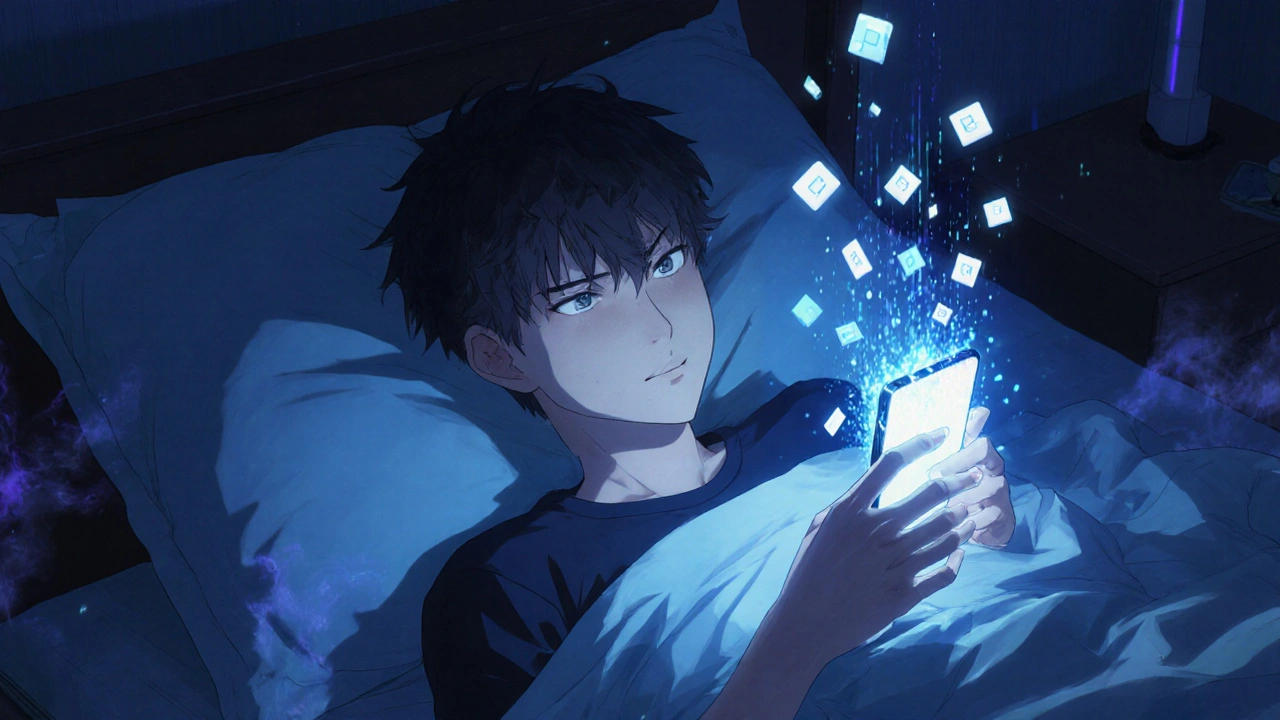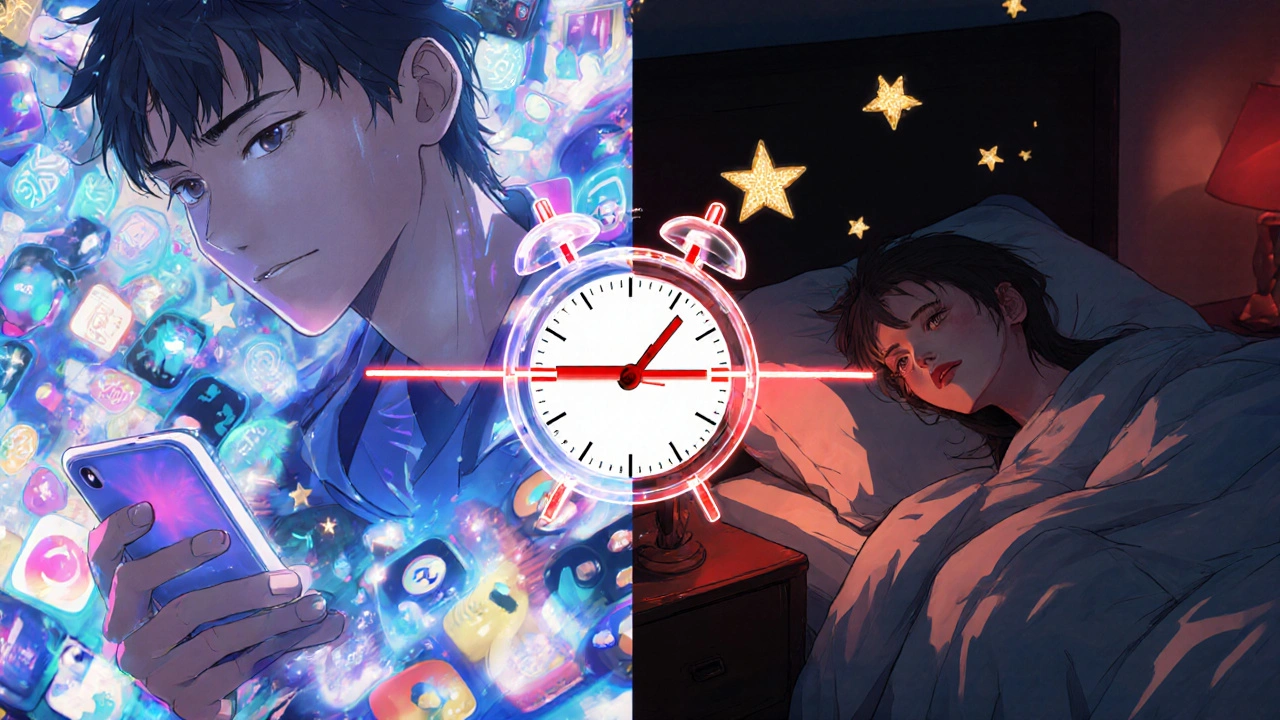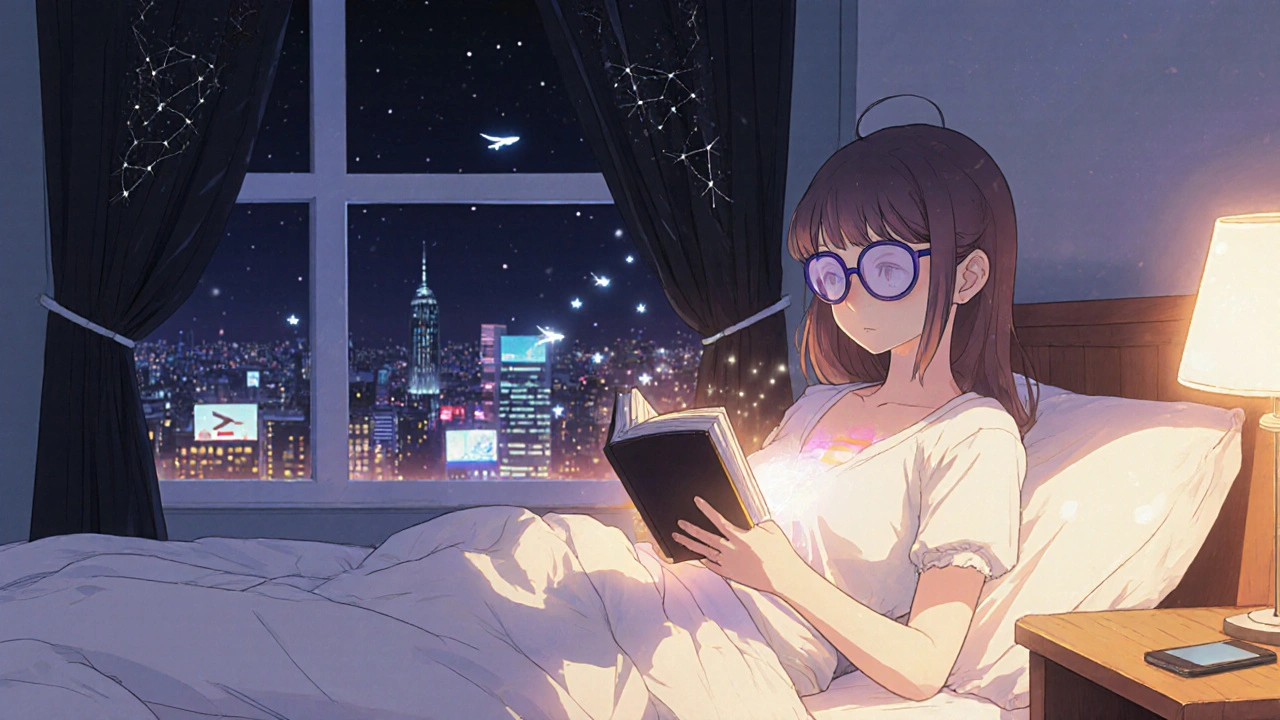Blue Light and Sleep: How to Set Screen Time Limits for Better Rest

Most people scroll through their phones right up until they turn off the light. It feels harmless - just a few minutes of Netflix, a quick scroll through Instagram, or replying to messages. But if you’re struggling to fall asleep, tossing and turning, or waking up tired even after eight hours in bed, your evening screen time might be the real culprit. It’s not just about how much you’re using your devices - it’s when you’re using them.
Why Blue Light Disrupts Your Sleep
Your body has a built-in clock, called the circadian rhythm, that tells you when to feel awake and when to feel sleepy. This clock is controlled by a hormone called melatonin. As darkness falls, your brain naturally starts releasing melatonin to help you drift off. But here’s the problem: the blue light from your phone, tablet, or computer tricks your brain into thinking it’s still daytime. Blue light falls in the 400-495 nanometer range of the visible light spectrum. The most disruptive part is between 460-480 nanometers - the exact range emitted most strongly by LED screens. Research from Harvard Medical School in 2012 showed that just 6.5 hours of blue light exposure suppressed melatonin for about three hours, compared to only 1.5 hours with green light. That means your body’s sleep signal gets delayed, and you end up lying awake longer than you should. Even worse, modern screens emit 30-40% blue light. That’s double what traditional incandescent bulbs gave off. At a typical viewing distance of 30 cm, two hours of phone use before bed can expose you to 30-50 lux of blue light - enough to cut melatonin production by half compared to dim red light.The Science Behind the Sleep Disruption
It’s not just about brightness. Your eyes have special cells called intrinsically photosensitive retinal ganglion cells (ipRGCs) that detect light and send signals directly to your brain’s sleep-wake center. These cells are most sensitive to blue wavelengths around 490 nanometers. When they’re activated by screen light at night, they tell your brain: “Stay alert.” Some studies have questioned whether blue light is uniquely to blame. A 2022 University of Toronto study found no difference in melatonin levels between people exposed to blueish, yellowish, or white light - as long as the total stimulation to ipRGCs was equal. That suggests it’s not the color alone, but the overall light intensity and timing that matter most. Still, the majority of research supports the link. A 2023 review in Scientific Reports confirmed that blue light exposure before bed consistently delays sleep onset. And when people wear blue-light-blocking glasses for two hours before sleep, studies show measurable improvements in sleep quality, longer sleep duration, and better satisfaction with rest.What Experts Recommend
The American Academy of Sleep Medicine (AASM) issued clear guidance in 2020: avoid screens for at least one hour before bed. Why? Because 83% of Americans use electronic devices within an hour of sleep, according to the National Sleep Foundation. That’s not a coincidence - it’s a pattern that’s hurting sleep quality across the country. Harvard researchers suggest an even stricter cutoff: no bright screens after 9 p.m. if your bedtime is 11 p.m. The logic? Your body needs a quiet, low-light wind-down period to shift from daytime alertness to nighttime rest. Even if you’re not looking at the screen, having it nearby - with notifications flashing - keeps your brain in a state of readiness. Dr. Matthew Walker, a leading sleep scientist at UC Berkeley, points out another layer: even if blue light’s direct effect is smaller than we thought, the real damage comes from what screens replace. Instead of reading, meditating, or talking with a partner, you’re consuming stimulating content - arguments, news, videos, games - that keep your mind racing. That mental stimulation is just as disruptive as the light itself.
How Much Screen Time Is Too Much Before Bed?
There’s no magic number that works for everyone, but the evidence points to a clear range:- 1 hour: Minimum recommended cutoff. If you stop all screens an hour before bed, you’ll see noticeable improvements in falling asleep faster.
- 90 minutes: The sweet spot. In a Sleep Foundation survey, 83% of people who followed a 90-minute screen-free rule reduced their sleep onset time from over 45 minutes to under 20 minutes.
- 2 hours: Ideal for chronic insomniacs or those with severe sleep issues. This gives your body enough time to fully ramp up melatonin production.
Practical Tips to Reduce Blue Light Exposure
You don’t need to throw out your devices. You just need to change how you use them at night.- Use built-in night modes. Turn on Night Shift (iOS) or Night Light (Android/Windows). These features reduce blue light by up to 60%, according to DisplayMate Technologies. Set them to activate automatically one hour before your bedtime.
- Lower brightness. Keep your screen brightness below 50 nits - roughly 30% of maximum. Bright screens are worse than long exposure times.
- Keep distance. Hold your phone at least 40 cm (16 inches) away. Light intensity drops sharply with distance.
- Try blue-light-blocking glasses. If you must work on a computer at night, these glasses can help. But be warned: 22% of users report color distortion makes screen work harder. They’re best for non-work evening use.
- Create a screen-free zone. Leave your phone in another room. Use a traditional alarm clock instead of your phone. If you need it nearby for emergencies, put it on airplane mode and face it down.
What Doesn’t Work
A lot of products promise to fix blue light problems - filters, apps, special bulbs, LED strips. But not all of them deliver. - Blue light filter apps alone won’t fix poor sleep habits. A 2023 Sleepopolis forum analysis found 32% of users saw little improvement from filters unless they also stopped scrolling, reading, or watching videos before bed. - Dimming the screen isn’t enough if you’re still mentally engaged. Reading an ebook on a tablet with Night Shift on is better than scrolling TikTok, but it’s still not as restful as reading a physical book. - Wearing blue-light glasses while using a bright screen? Not helpful. If you’re staring at a 300-nit screen with glasses on, your ipRGCs are still getting overloaded. The goal is to reduce both light intensity and mental stimulation.
What’s Changing in 2025
Technology is catching up. Apple’s Sleep Focus mode, introduced in iOS 17 (September 2023), automatically dims your screen, silences notifications, and launches a calming wallpaper one hour before your scheduled bedtime. Android and Windows have similar features rolling out. The FDA is currently reviewing blue light exposure guidelines - results expected by Q3 2024. Meanwhile, the National Institutes of Health is funding a $2.4 million study on blue light’s impact on teens, with early findings due in early 2025. Companies are also taking notice. 43% of Fortune 500 firms now have “digital sunset” policies, encouraging employees to log off an hour before end-of-day.Real Results From Real People
Reddit’s r/sleep community has over 1.2 million members. In a 2022 thread analysis, 78% of users who started using blue light filters reported falling asleep 15-20 minutes faster. On Amazon, 68% of users who bought blue-light-blocking glasses said they noticed a “significant improvement” in falling asleep. But the biggest wins come from behavior, not gadgets. One user in Brisbane wrote: “I stopped checking my phone after 9 p.m. and started reading a novel instead. I used to lie awake for an hour. Now I’m asleep in 12 minutes. It’s not the glasses - it’s the quiet.”Start Small, Stick With It
You don’t need to go cold turkey. Pick one change and try it for a week: - Turn on Night Shift every night at 9 p.m. - Charge your phone outside your bedroom. - Replace 30 minutes of scrolling with stretching or deep breathing. Track how you feel in the morning. Are you waking up less groggy? Do you feel more alert by midday? Those are your real indicators of progress. Sleep isn’t about fixing one broken thing. It’s about creating space - quiet, calm, dark space - for your body to do what it was designed to do: rest.Does blue light from screens really affect sleep?
Yes. Multiple studies, including those from Harvard Medical School and the American Academy of Sleep Medicine, show that blue light from screens suppresses melatonin production, delays sleep onset, and reduces sleep quality. The effect is strongest when exposure happens within two hours of bedtime.
How long before bed should I stop using screens?
The American Academy of Sleep Medicine recommends at least one hour without screens. For better results, aim for 90 minutes. People who follow this rule consistently report falling asleep 20-30 minutes faster than those who don’t.
Are blue light blocking glasses worth it?
They can help, especially if you work on screens at night. About 68% of users report better sleep, but 22% find the color distortion makes screen use uncomfortable. They’re most effective when combined with lower brightness and reduced screen time.
Does Night Shift or f.lux actually work?
Yes. These tools reduce blue light by 50-60%, according to display testing by DisplayMate Technologies. But they’re not a cure-all. If you’re still scrolling social media or watching intense videos, your brain stays stimulated. Use them as a tool, not a replacement for healthy habits.
Can I still use my phone if I turn on dark mode?
Dark mode reduces overall brightness and can help, but it doesn’t remove blue light. A dark screen with blue pixels still emits the same wavelengths that suppress melatonin. Combine dark mode with Night Shift and keep your brightness low.
What if I work night shifts? Should I avoid blue light then?
If you work nights, blue light can actually help you stay alert during your shift. But after your shift, when you’re trying to sleep during the day, you need total darkness. Use blackout curtains and avoid screens for at least an hour before daytime sleep. Blue light during your sleep window will disrupt your rest, no matter your schedule.
Is blue light the only reason I can’t sleep?
No. Stress, caffeine, irregular sleep schedules, and mental stimulation from content (like news or arguments) are bigger disruptors for many people. Blue light is one piece - but not the whole puzzle. Fixing sleep means addressing habits, environment, and mindset - not just screen time.






Comments
kora ortiz
November 17, 2025 AT 21:11Stop blaming the screen. Your brain is wired to crave stimulation. Put the phone down, read a book, or just sit in silence. No app, filter, or pair of glasses will fix a habit you refuse to change.
Kathryn Ware
November 18, 2025 AT 21:10I used to be the person who scrolled until my eyes burned 😴 then woke up like a zombie. I started using Night Shift + charging my phone in the kitchen. First week? Hard. Second week? Still annoying. Third week? I forgot I even had a phone. Now I fall asleep in 10 minutes. No glasses. No apps. Just distance and discipline. It’s not magic-it’s just not being a zombie on a screen. Try it for 7 days. You’ll thank yourself. 🌙✨
Jeremy Hernandez
November 19, 2025 AT 17:31Blue light? LOL. The real issue is corporations selling you FOMO as a lifestyle. They want you addicted so you keep buying their shit. Night Shift? That’s a placebo for people who think tech can fix their broken attention spans. The truth? Your phone is a dopamine slot machine. Stop pretending the light’s the villain. The villain’s the algorithm.
Tarryne Rolle
November 19, 2025 AT 19:38Who decided sleep was a priority? In a world that glorifies hustle, rest is a luxury reserved for the privileged. We’re not failing because of blue light-we’re failing because we were never taught how to be still. The real crisis isn’t melatonin suppression-it’s the erosion of silence. We’ve turned our minds into 24/7 newsfeeds and now we’re surprised we can’t sleep. Maybe the problem isn’t the screen. Maybe it’s the soul behind it.
saurabh lamba
November 21, 2025 AT 15:58Bro I tried all this stuff. Night shift, glasses, dark mode. Still woke up at 3am. Then I realized-I was scrolling Reddit in bed. The light wasn’t the problem. My brain was still at work. Now I just listen to rain sounds and stare at the ceiling. No phone. No effort. Sleep came. Simple.
Kiran Mandavkar
November 22, 2025 AT 11:29Anyone who thinks blue light is the main issue hasn’t read the real science. The 2022 Toronto study was peer-reviewed. You’re being sold a narrative by the sleep industry. People who use glasses and filters are just buying expensive placebo products while ignoring the real problem: their life is a mess. Stress, caffeine, anxiety-those are the killers. Not your iPhone’s color temperature.
Shannon Hale
November 23, 2025 AT 15:37OH MY GOD. I JUST REALIZED I’VE BEEN DOING THIS WRONG FOR YEARS. I THOUGHT NIGHT SHIFT WAS ENOUGH. I WAS STAYING UP UNTIL 1AM SCROLLING TIKTOK WITH A DARK MODE PHONE. MY BRAIN WAS ON FIRE. I JUST MOVED MY PHONE TO THE LIVING ROOM. I READ A BOOK FOR 20 MINUTES. I WENT TO SLEEP AT 10:45. I WOKE UP AT 6:30 WITHOUT AN ALARM. I’M CRYING. I’M ALIVE AGAIN. 🙏💔🌙
Holli Yancey
November 24, 2025 AT 14:01I think the most powerful thing here isn’t the tech-it’s the ritual. The act of putting the phone down becomes a signal to your nervous system: ‘It’s safe to rest now.’ That’s why even reading on a tablet with Night Shift on still feels off. You’re not creating space-you’re just changing the lighting. The real fix is creating a boundary. A quiet moment. A breath before bed.
Gordon Mcdonough
November 25, 2025 AT 22:41Why are we even talking about this? In my day we just turned off the lights and went to sleep. No filters. No apps. No fucking glasses. Now everyone’s got a PhD in sleep optimization. It’s pathetic. You want to sleep? Don’t touch the damn phone. Simple. Not rocket science. Stop overcomplicating it. And stop buying this crap. I’m telling you, it’s all corporate BS.
shubham seth
November 27, 2025 AT 16:37Let’s be real. The real blue light villain isn’t your phone-it’s your job. You’re exhausted because you’re working 12-hour days and your brain never shuts off. No amount of Night Shift is gonna fix burnout. You need a vacation. A new job. Or at least a therapist. Stop blaming the screen. Blame the system that turned you into a machine.
Kyle Swatt
November 28, 2025 AT 20:02I used to think sleep was just about physics-light, hormones, timing. Then I started journaling for 5 minutes before bed. Not about the day. Just about how I felt. And something shifted. The screen stopped being an escape. It became a distraction from myself. The blue light was just the symptom. The real cure? Facing what you’re running from. Not the phone. Not the light. You.
Deb McLachlin
November 29, 2025 AT 20:53The empirical data supporting reduced melatonin suppression with blue light filtering is robust. However, behavioral interventions-such as consistent sleep hygiene and cognitive behavioral therapy for insomnia (CBT-I)-demonstrate significantly greater effect sizes in longitudinal studies. The most effective approach integrates both environmental modification and psychological retraining. I would recommend consulting a sleep specialist if symptoms persist beyond four weeks of behavioral change.
Eric Healy
December 1, 2025 AT 10:06Y’all are overthinking this. I just turn my phone to grayscale at night. No more pretty pics. No more videos. Just boring gray. I fall asleep faster. No glasses. No apps. Just a little boredom. Sometimes the cure isn’t more tech-it’s less color.